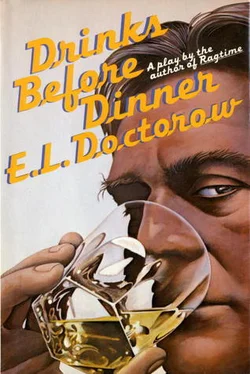Edgar Doctorow - Drinks Before Dinner
Здесь есть возможность читать онлайн «Edgar Doctorow - Drinks Before Dinner» весь текст электронной книги совершенно бесплатно (целиком полную версию без сокращений). В некоторых случаях можно слушать аудио, скачать через торрент в формате fb2 и присутствует краткое содержание. Год выпуска: 2011, Издательство: Random House, Жанр: Драматургия, на английском языке. Описание произведения, (предисловие) а так же отзывы посетителей доступны на портале библиотеки ЛибКат.
- Название:Drinks Before Dinner
- Автор:
- Издательство:Random House
- Жанр:
- Год:2011
- ISBN:нет данных
- Рейтинг книги:4 / 5. Голосов: 1
-
Избранное:Добавить в избранное
- Отзывы:
-
Ваша оценка:
- 80
- 1
- 2
- 3
- 4
- 5
Drinks Before Dinner: краткое содержание, описание и аннотация
Предлагаем к чтению аннотацию, описание, краткое содержание или предисловие (зависит от того, что написал сам автор книги «Drinks Before Dinner»). Если вы не нашли необходимую информацию о книге — напишите в комментариях, мы постараемся отыскать её.
Drinks Before Dinner — читать онлайн бесплатно полную книгу (весь текст) целиком
Ниже представлен текст книги, разбитый по страницам. Система сохранения места последней прочитанной страницы, позволяет с удобством читать онлайн бесплатно книгу «Drinks Before Dinner», без необходимости каждый раз заново искать на чём Вы остановились. Поставьте закладку, и сможете в любой момент перейти на страницу, на которой закончили чтение.
Интервал:
Закладка:
So my characters are formal expressions of the basic passion of the play — an imitative fallacy perhaps, but only if you want from the theatre what you’re used to. They seemed to be uniformly well-to-do and reasonably well educated, but they have no domestic biographies to offer, no childhoods to remember, no religion, no regional identification. Only two, Joel and Alan, are given professions. There are no blood relationships except for the parents Joel and Claudette and their two children, but even this is conceptualized as an arbitrary genetic circumstance. Deprived of virtually everything else, these characters can only have their being from their positions in the dialogue. After Edgar proposes that they not have the evening they expect to have, the sides are drawn. His wife Joan is his first antagonist. She is succeeded by Joel and Claudette, who defend the life and attitudes that allow them to give parties and live well. Joel is perhaps less resolute and more foolish than Claudette, and he lacks her bitter fatalism, but he is quite capable of being clever at Edgar’s expense. In Act Two, Joel and Claudette are superseded as antagonists by Alan, whose capacity for disguising himself as a function of the argument, agreeing or disagreeing with Edgar as tactics demand, gradually betrays him to a cynicism that loses the sympathy of everyone else in the room. For it is Alan who torpedoes the one presumption not questioned by Edgar insofar as he believes in the idea of the end of the world — the theological hope of redemption, of the possibility of something more through suffering and universal purgation.
As for Andrea and Michael, I think of them as the ballast of the play, their weight shifting to one side or the other as the moment demands, Andrea because she is willing to discuss anything, consider anything, in the spirit of self-improvement, or to mediate as one always sensitive to the feelings of others, and Michael, more mysteriously, because he is observant, and curious and thoughtful. I think it is Michael who becomes the most thoroughgoing disciple of Edgar, but for purposes entirely his own.

Drinks Before Dinner deals in general statements about the most common circumstances of our lives, the numbers of us, the cars we drive, the television we watch, the cities we live in, our contraception and our armaments, and our understanding sense of apocalypse. None of these circumstances are visible onstage except as imagery makes them visible. Instead of a play in which specific biographees suffer experiences that we enlarge upon to reflect our own, instead of a progression from the particular person to the thematic implication, we have a play already in the region of the implicatory when the curtain rises. That is why it is so offensive. It is a play turned inside out. It displays human beings not filled in with the colors and textures of their individual peculiarity, but delineated from the outlines provided by the things that shape them, their technology, their failing rituals and faltering institutions, their platitudinous ideas and common fears. They are invisible presences, these people, ghosts, shown only as a space in their surroundings. Like Wells’s Invisible Man, they can be seen only when wrapped in bandages.
Since the character of Edgar carries the burden of the argument, he is the center of the play’s offense. Edgar is insufferable. He insists upon talking about what everyone knows. He is not a criminal psychopath, nor is he a revolutionary — two suggestions the others come up with to explain his behavior. He is not a psychopath, because he is fully connected to the realities of his life and is more interested, I suspect, in dramatizing the issues that obsess him, or in sharing his passion, than in killing or taking revenge. (The culmination of his violence occurs only when Alan, a man of power, seems unwilling to accept the moral responsibilities of his office.) And he is not a radical, because he offers no analysis as to why things are as he finds them. He can feel, he can describe, but he cannot explain. What he is, truly, is a person suffering from acute moral revulsion; he is a moral hysteric who has reached the limits of his endurance.
In fact, he sports some of the more unfortunate characteristics of the ancient prophets. Prophets went about exaggerating everything that was wrong in their society and they warned what would happen if things didn’t change. They made dramatic, symbolic gestures to get their ideas across to people who didn’t want to hear them: Isaiah went out naked and Jeremiah wore a yoke around his neck. Edgar brandishes a gun, the device of a world perfecting itself for Armageddon, but as with his antecedents, to make people listen whether they would like to or not. Certainly it is an arrogant role to choose for oneself, and for his trouble Edgar suffers the expropriation of his faith in the idea of redemption and renewal. So the joke is on him.
Nevertheless, a community of perception has been formed. Condemned, renounced and alone — dinner about to be served.
I must warn future directors and actors of the play that with a language frankly rhetorical and sometimes incantatory, with a playwright who prefers a hundred words to one gesture, with a text that neglects the ordinary benefits of characterization and the interaction of ordinarily characterized persons, in which the spectacle is static and the words tumultuous and relentless (in fact, that is the first image I had of a production — a storm of language contained by a minimum of gesture and movement), this play does not solicit conventional theatrical sentiment from its audience. It should not be hammered and twisted in order to do so. The actors should be discouraged from imagining histories for their characters or inventing relationships not indicated in the text. They should put on the words, as their costumes, and see what happens.
On the whole the production should be conceived in such a way as to keep the audience from thinking in practical terms and asking practical questions — as, for example, why nobody takes the gun away from Edgar. Perhaps the play should be thought of as spoken opera, with aria and recitative, the music being in the imagery, the action more grand than behavioral. The stage has to go through several metaphorical transformations, from a living room to a hijacked territory to an earth in apocalypse, to an ark. It might manage this more easily if the production did not suggest everyday naturalism.
The director will find a very thin line separating the portrayal of Edgar as a menace, or as no threat at all. Either extreme is wrong. Edgar is threatening but must keep the audience’s allegiance. The real suspense is to see how much diffuse complaint the artist can get away with before the occasion loses its power. The answer lies in each individual Edgar. There must be enough tension in the introduction of the gun and its display, but not enough to appall the audience. In the original production the gun was handled as an unfamiliar object, definitely not as John Wayne or Clint Eastwood would handle it. In this country, perhaps now in all countries, the difficulty of introducing a gun onstage is in making it somehow more than the class of guns in Westerns, detective thrillers, guns in films and TV programs. The audience’s easy familiarity with the guns of popular culture must be stripped away — the sense of this gun must be of one introduced into their own living room.
Another recourse is to play the play as the comedy it is, not just at the beginning but all the way through: play against the melodrama of the piece, just touch the gun to the head and forgo the tensions of realistically threatening to blow someone’s brains out right there onstage. But in any case, Edgar should never leer, gloat, sneer, swagger or mock or tease the others. He is not macho . He is someone who helplessly tells his truth, as visionaries do, without tact. Acting against the lines, as it were, he may advance on Alan almost as if commanded by logic, and with glee, the popular culture must be stripped away — the sense of this gun to the head an extension of the argument, not the ending of it.
Читать дальшеИнтервал:
Закладка:
Похожие книги на «Drinks Before Dinner»
Представляем Вашему вниманию похожие книги на «Drinks Before Dinner» списком для выбора. Мы отобрали схожую по названию и смыслу литературу в надежде предоставить читателям больше вариантов отыскать новые, интересные, ещё непрочитанные произведения.
Обсуждение, отзывы о книге «Drinks Before Dinner» и просто собственные мнения читателей. Оставьте ваши комментарии, напишите, что Вы думаете о произведении, его смысле или главных героях. Укажите что конкретно понравилось, а что нет, и почему Вы так считаете.












